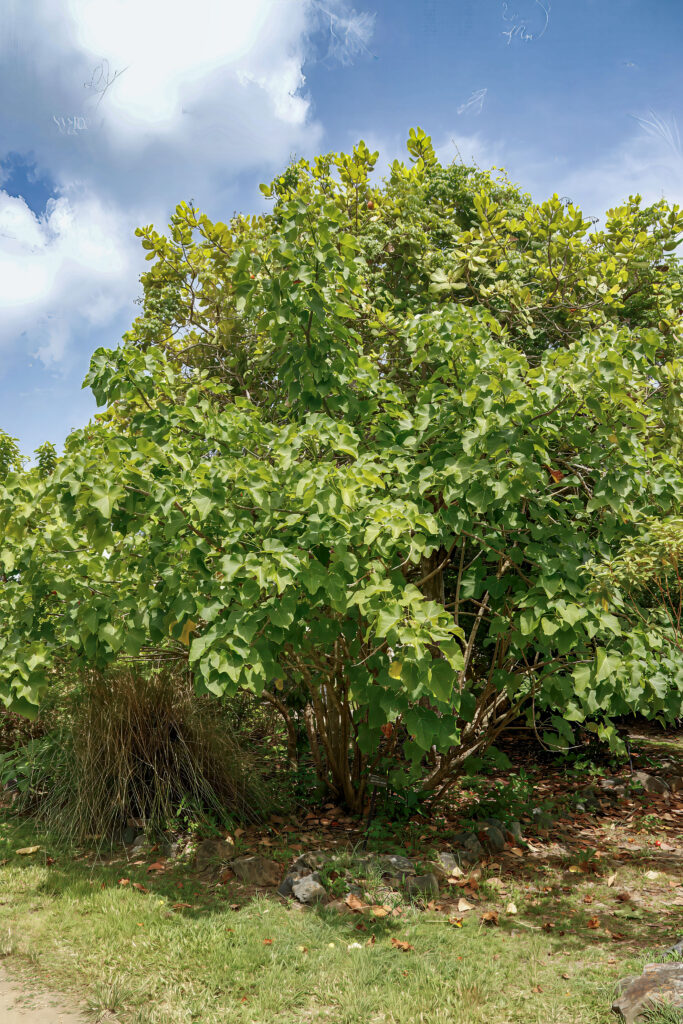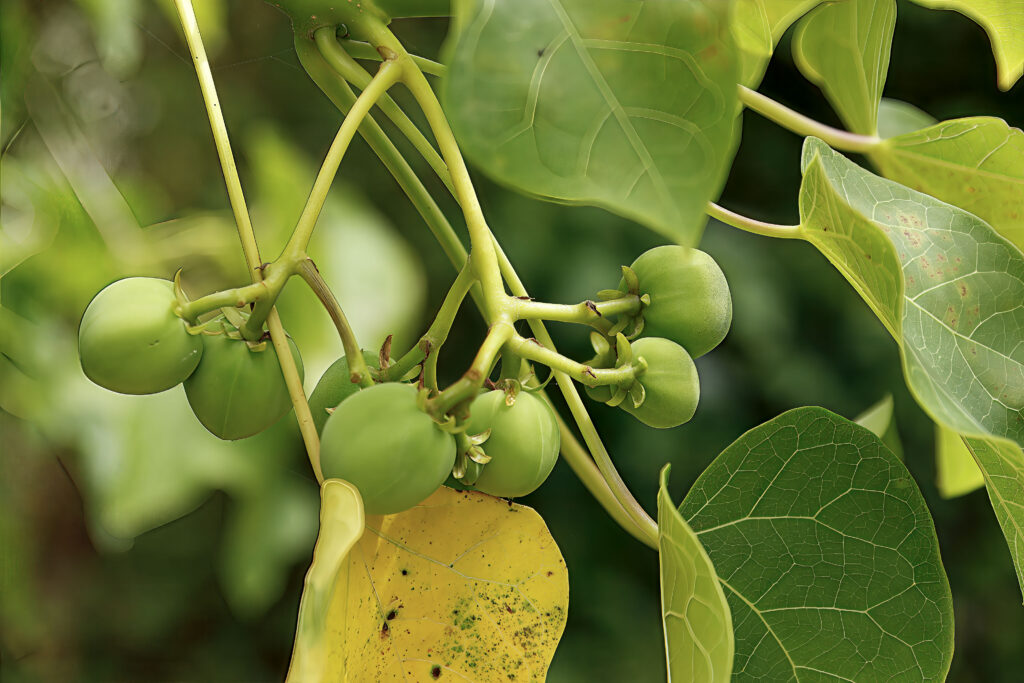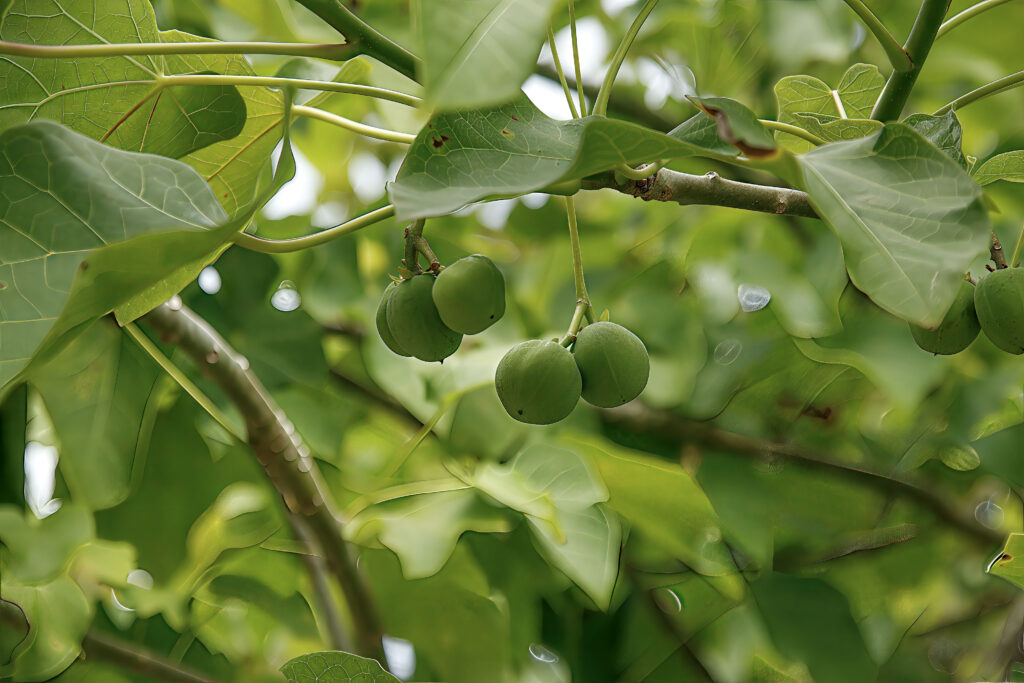Physic Nut
Scientific name: Jatropha curcas
The Physic Nut, scientifically known as Jatropha curcas, is a hardy, drought-tolerant shrub or small tree belonging to the Euphorbiaceae family. It has gained attention in recent years for its various uses, particularly in the areas of biodiesel production, traditional medicine, and environmental benefits. The plant is native to the tropical regions of Central and South America but has since spread widely across tropical and subtropical regions worldwide, including parts of Africa, Asia, and the Caribbean.
Origin of the Name
The name “Physic Nut” comes from the old-fashioned use of the word “physic,” which historically meant medicine or a medicinal purge rather than modern-day physics or physical science.
In early English usage—especially from the 15th to 18th centuries—“physic” referred to healing practices, usually herbal or plant-based remedies. The word was often used to describe laxatives or purgatives, which were common in traditional medicine at the time.
So why “Physic Nut”?
The seeds of Jatropha curcas (the Physic Nut) were traditionally used as a powerful purgative—in other words, they would induce vomiting or bowel movements. Because of this strong effect, the plant was called the “Physic Nut,” identifying it as a medicinal (but harsh!) nut.
Description and Characteristics
Physic Nut is a fast-growing, deciduous plant that can reach heights of up to 12 feet (3.6 meters). It has dark green, leathery leaves that are typically palmate, with 3-5 lobes. The plant produces small, yellow-green flowers that grow in clusters, followed by the development of a three-lobed fruit. The fruit is a capsule that contains seeds, which are the most valuable part of the plant due to their oil content.
The seeds of Jatropha curcas contain a high percentage of oil, making them a valuable resource for biodiesel production. The oil extracted from the seeds is also used in the manufacturing of soaps, cosmetics, and other industrial products. However, the seeds are toxic and should not be consumed directly, as they contain compounds like phorbol esters, which are harmful to humans and animals.
Uses of Physic Nut
- Biodiesel Production:
One of the most significant uses of Physic Nut is in the production of biodiesel. The oil extracted from its seeds is a promising source of renewable energy. The high oil content of the seeds makes them a suitable alternative to conventional fossil fuels, and Jatropha curcas has been promoted as a potential solution for sustainable bioenergy. The plant is particularly valued for its ability to thrive in arid conditions, making it ideal for cultivation in regions with low rainfall, where other crops might struggle. - Traditional Medicine:
In various cultures, particularly in tropical and subtropical regions, the Physic Nut has been used for its medicinal properties. The plant’s various parts, including the leaves, bark, and seeds, have been used in folk medicine to treat a wide range of ailments, including wounds, ulcers, and infections. The oil from the seeds has been used in traditional medicine as an anti-inflammatory, antimicrobial, and analgesic agent. Despite its traditional uses, caution must be exercised due to the toxic nature of the seeds. They are not safe for consumption in large amounts, and improper handling can lead to poisoning. - Environmental Benefits:
As a drought-tolerant plant, Physic Nut can be grown in degraded soils and arid regions, where it contributes to soil stabilization and prevents erosion. The deep root system of the plant helps in maintaining soil integrity, and its growth can help improve the fertility of the soil over time. Additionally, the plant can be used for reforestation efforts in areas that are vulnerable to desertification. - Industrial Uses:
The oil extracted from the seeds of Jatropha curcas has various industrial applications. It is used in the production of biodegradable plastics, soaps, and cosmetics. The by-products of oil extraction, such as cake and meal, can also be used as animal feed or as a source of fertilizer, making the plant an excellent candidate for sustainable agricultural systems.
Cultivation and Growing Conditions
Physic Nut is relatively easy to grow and thrives in tropical and subtropical climates. It prefers well-drained soils and can tolerate poor soil conditions, including sandy and rocky soils. The plant is highly drought-resistant, making it ideal for regions with limited water availability. Jatropha curcas is usually propagated through seeds, and it can be grown in both large-scale plantations and smaller home gardens.
While it is a low-maintenance plant, Jatropha curcas does require adequate sunlight for optimal growth. The plant can withstand temperatures ranging from 20°C to 40°C (68°F to 104°F) and can be grown in a variety of soil types, although it grows best in soils with a pH of 6 to 7.
Challenges and Considerations
Although Physic Nut offers many benefits, there are also challenges associated with its cultivation. The plant is considered toxic, particularly the seeds, which must be handled with care to avoid accidental poisoning. Additionally, the oil extraction process can be expensive, and efforts are ongoing to improve its cost-effectiveness for biodiesel production.
Furthermore, while Jatropha curcas is a promising crop for bioenergy, its widespread cultivation has raised concerns about the potential impact on food production. There are concerns that large-scale cultivation of Jatropha could lead to competition for land and water resources, particularly in developing countries where food security is a pressing issue.


